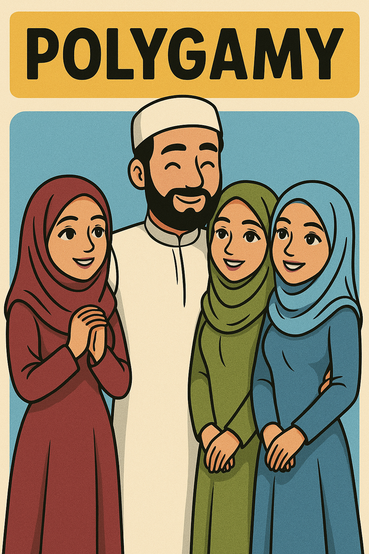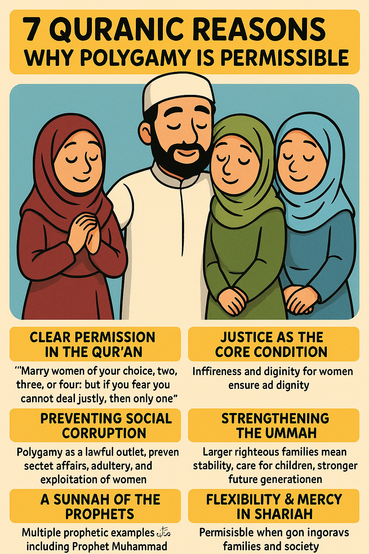Secrets of polygamous marriage
The whole history of human development suggests that a man is polygamous. None of the Divine Scriptures claims the opposite, does not directly indicate that exclusively monogamous marriage is allowed. These statements grew later, when local beliefs or some traditions were superimposed on the religious basis.
Moreover, artificial monogamous marriages and the ban on divorce brought turmoil to the world – the institution of prostitution, the system of mistresses, the problems of civil marriages and free love.
Islam, being the softest and most flexible religion, taking into account both the interests of a "polygamous" man and a woman's right to family stability, limited the possible number of wives at one time.
What does Islamic law say on this issue? A man, indeed, has the right to marry more than one wife, but their total number at one time is limited to four.
Polygamy - why?
The reasons that encourage a man to remarry may be different:
- infertility or inability of the first spouse to procreate;
- conditions of the war or post-war period, when the number of unmarried women and widows (in need of home improvement, care and care) exceeds the number of men;
- the physiological characteristics of a man, expressed in excessive sexual activity (provided there is sufficient material support for two or more families), which can create the ground for adultery, which is a great sin before the Almighty and the family.
IMPORTANT!!! A man who has married more than one should treat all his wives equally fairly.
The conclusion from the above is unambiguous: the second, and even more so the third and fourth, family is a permission ("mubah") under certain circumstances and requires some sacrifices in order to exist in an optimal way for everyone, without harming anyone.

7 Reasons Why Polygamy is Considered Acceptable
Religious & Cultural Legitimacy
In many faiths and traditions, polygamy is recognized and regulated—making it a morally and spiritually valid choice for those who follow these teachings.
Support for Widows & Divorcees
Historically and today, polygamy provides security for widows, single mothers, and divorcees who may otherwise struggle socially or financially.
Fairness & Regulation vs. Secrecy
In societies where multiple partnerships happen informally, polygamy ensures relationships are transparent, honest, and bound by responsibility instead of hidden affairs.
Strengthening Family Bonds
Larger family structures can create stronger social safety nets—children gain more caregivers, and households benefit from shared resources and teamwork.
Choice & Freedom of Lifestyle
For consenting adults, polygamy represents a choice—just as monogamy does. Respecting diverse family structures upholds individual freedom.
Economic & Social Stability
More adults contributing to a household means better financial security, shared childcare, and resilience against life’s challenges.
Compassion & Responsibility
At its best, polygamy is not about desire but about compassion—men taking responsibility for more than one family when circumstances demand it.
✨ The key idea: Polygamy, when entered into with fairness, consent, and responsibility, can provide stability, protection, and dignity for many who otherwise might be left vulnerable.

7 Quranic Reasons Why Polygamy is Permissible
Clear Permission in the Qur’an
Allah explicitly permits polygamy in Surah An-Nisa (4:3): “Marry women of your choice, two, three, or four; but if you fear you cannot deal justly, then only one.” This shows polygamy is not forbidden but regulated.
Justice as the Core Condition
The Qur’an ties polygamy to justice: if a man cannot be fair among his wives, he must limit himself to one. This ensures fairness and dignity for women.
Protection for Widows & Orphans
Surah An-Nisa revealed polygamy in a context of war, where many women were left widowed and children orphaned. Multiple marriages ensured protection and provision for them.
Preventing Social Corruption
The Qur’an’s allowance of polygamy gives a lawful outlet, preventing secret affairs, adultery, and exploitation of women. It turns desire into responsibility.
Strengthening the Ummah
Larger righteous families mean more stability, more care for children, and stronger future generations—all encouraged in Islam.
A Sunnah of the Prophets
Many Prophets, including Prophet Muhammad ﷺ, had more than one wife. Their examples show polygamy is not shameful but an honored tradition when done with justice.
Flexibility & Mercy in Shariah
Islam recognizes human needs and social realities. Polygamy is not an obligation, but a merciful allowance—permissible when it benefits families and society.












